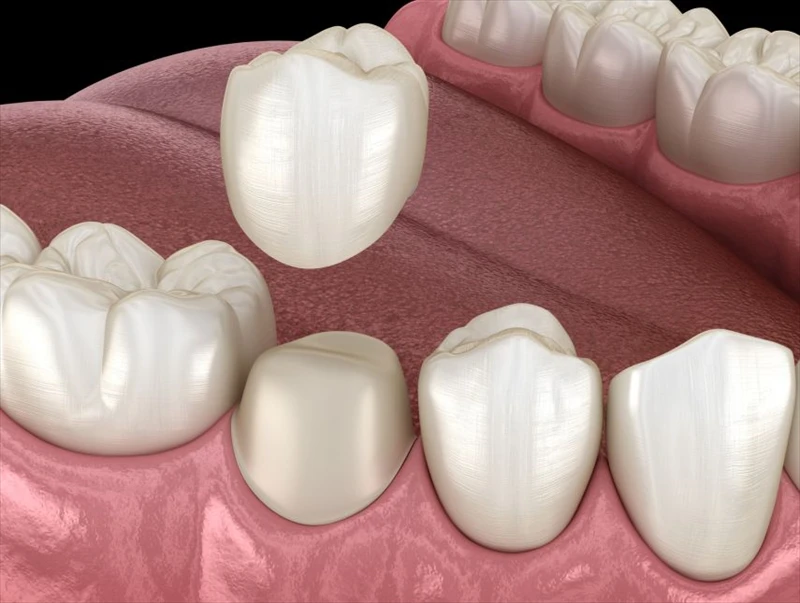Dental Crowns

Dental Crowns
Dental crowns are a popular restorative dentistry treatment used to repair and protect damaged teeth from further damage. A crown is a custom-made cap that is placed over a tooth, completely encasing it and restoring its shape, size, strength, and appearance. When a tooth has significant decay, chips, cracks, or fractures, a crown can help protect its function.
Dental crowns are made of a variety of materials, including porcelain, metal, or a combination of both. Porcelain crowns offer the most natural-looking results, as they can be customized to match the shade of your existing teeth. Metal crowns are typically made of gold or another metal alloy and are a great choice for teeth that are not visible when you smile.
The process of having a dental crown placed usually requires two visits to the dentist. During the first visit, your dentist will take impressions of your teeth and design your crown. At the second visit, your crown will be placed and secured with special dental cement. Once your crown is in place, you should take special care to brush and floss it regularly to keep it clean and free of plaque buildup.
The benefits of getting a dental crown are numerous. Crowns can help restore the strength and function of a damaged tooth, and can also help improve the appearance of a discolored or misshapen tooth. They also protect a tooth that may be at risk of further damage or decay.
If you're looking for a way to restore the appearance and function of a damaged tooth, dental crowns may be the perfect solution. Talk to your dentist to learn more about the benefits of crowns and to find out if they're the right treatment for you.
What are dental crowns? What are dental crown types?
Dental crowns are a type of restorative dentistry treatment used to repair and protect damaged teeth from further damage. A crown is a custom-made cap that is placed over a tooth, completely encasing it and restoring its shape, size, strength, and appearance. Crowns can be made of a variety of materials, including porcelain, metal, or a combination of both. Porcelain crowns offer the most natural-looking results, as they can be customized to match the shade of your existing teeth. Metal crowns are typically made of gold or another metal alloy and are a great choice for teeth that are not visible when you smile.
How long do dental crowns last? How much does a crown cost?
Dental crowns can last up to 15 years or more depending on the care they receive. The cost of a crown can vary significantly depending on the type of material used and where you have it placed. Porcelain crowns tend to be more expensive than metal crowns, but they can also provide more natural-looking results.
In general, the cost of a single crown ranges from $500 to $1,500. Many dental insurance plans cover at least a portion of the cost of a crown, so make sure to check with your insurer to find out what your coverage includes.
What are the key benefits of dental crowns?
Dental crowns are a common dental procedure that can provide several benefits to your teeth and overall oral health. A crown is a cap-like restoration that is placed over the top of a damaged or weak tooth. It is designed to protect the tooth structure and restore its appearance and function. Here are some of the key benefits of dental crowns.
1. Improved Appearance: One of the most noticeable benefits of a dental crown is its ability to improve the appearance of your smile. A crown can help to restore the natural shape and color of your tooth, making it look more aesthetically pleasing. It can also help to fill in any gaps or spaces between your teeth.
2. Strength: Dental crowns can help to strengthen a tooth that has been weakened due to decay or damage. The crown acts as an additional layer of protection, helping to reinforce the tooth and making it less likely to break or chip.
3. Better Bite: A dental crown can also help to improve your bite, as it helps to restore the natural contours of your tooth. This can help to ensure that your bite is balanced and comfortable, eliminating any pain or discomfort associated with misaligned teeth.
4. Improved Comfort: When a damaged or decayed tooth is treated with a crown, it helps to reduce any sensitivity or discomfort associated with the tooth. The crown acts as a protective barrier, helping to insulate the tooth from hot and cold temperatures.
Overall, dental crowns can provide several benefits to your teeth and overall oral health. By restoring the strength, appearance, and comfort of the tooth, a crown can help to improve the quality of your life. If you are considering a dental crown, it is important to speak to your dentist to determine if it is the right cosmetic option for you.
Leave a Reply
Your email address will not be published. Required fields are marked *




One Comment
Make sure to replace your toothbrush every three months or when it begins to show wear, whichever comes first.
Reply